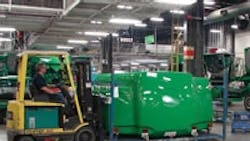With material costs and availability a continuing challenge for manufacturers, having a supplier you can count on to come through -- even when conditions are at their toughest -- can make all the difference in the world. Construction and agricultural equipment maker Deere & Co. realizes that as much as anyone, which is why the company acknowledges the efforts of its top suppliers every year as part of its Achieving Excellence program.
"It's an excellent way to recognize suppliers," notes Tom Knoll, vice president of worldwide supply management and logistics for Deere & Co. "It also allows us to work with them to get through difficult environments -- whether it's capacity issues or problems at the bottom of the cycle -- by having a tool in place that's regularly addressing those issues."
Achieving Excellence started out small, initiated by one of the company's factories in Davenport, Iowa, back in 1990. Today the program has been adopted by 35 Deere factories globally and includes approximately 1,200 suppliers. Roughly 250 awards are presented throughout several categories each year.
According to Knoll, the program not only provides a vehicle to measure and grade supplier performance, but also serves as an important mechanism to both reward and recognize its top performers. Naturally, the reward aspect is largely accomplished by throwing a little extra business in the direction of the winners. But the recognition is also important, highlighted by an invitation to an annual banquet attended by Deere's top brass, in addition to individual plant visits for all the winners.
"Essentially, wavelength measures how well we work together with a supplier," explains Knoll. "For example, when we have difficult issues, are we on the same page? If we have a quality problem, how well do we work together to resolve it? It's one of the most important categories we measure, because if you can't work well together you probably aren't going to be able to solve those sorts of problems."
Mid-year reviews are conducted to provide an opportunity to update suppliers on their progress, often resulting in collaborative strategies to improve performance before award recipients are determined. A Web-based platform also enables suppliers to periodically review their metrics for each plant they supply. Standings in relation to comparable suppliers are conveyed through various anonymous indicators, such as arrows, color codes or a numbered ranking.
According to Bryon Black, Deere's manager of Achieving Excellence, the company establishes baselines for each supplier's annual goals depending on how they are classified -- as an approved supplier, key supplier or a partner. Those classified as "conditional" suppliers fall short of minimum standards and are candidates for removal from the supply base. Throughout the year, performance gaps are identified to help suppliers determine what can be improved to reach the next level.
"We have continued to raise the bar and our expectations as the supply base has improved," notes Black. "But we have also tried to keep the program simple -- very concise, very consistent and using easily understandable metrics. It's easy to try to get too complex. If your suppliers don't understand it and if it isn't simple, you will have a problem in the long term."
While most of the focus is placed on the supply base, Deere also uses the program as a tool to improve its own operation. Deere's CROP (Cost Reduction Opportunity Program) gives suppliers a chance to enter their own cost-reduction suggestions, which can include potential changes to Deere's processes. Of course, suppliers are also rated on the number and quality of suggestions they offer.
As Achieving Excellence has grown over the years, it has continued to gain significance with suppliers all over the world. And that sentiment works both ways. Because as manufacturers are faced with seemingly more important matters, these efforts can easily fall down the list of priorities. But for those like Deere, the extra work seems to pay off for everyone involved.
"I'm pleasantly surprised by how much [this program] actually drives behavior throughout the supply chain," says Knoll. "A company might make it one year and not the next, and you can see that commitment they have to returning the following year. And it's not just about the banquet -- it's about being a partner supplier and being recognized for the commitment it takes to attain that status."
See Also
